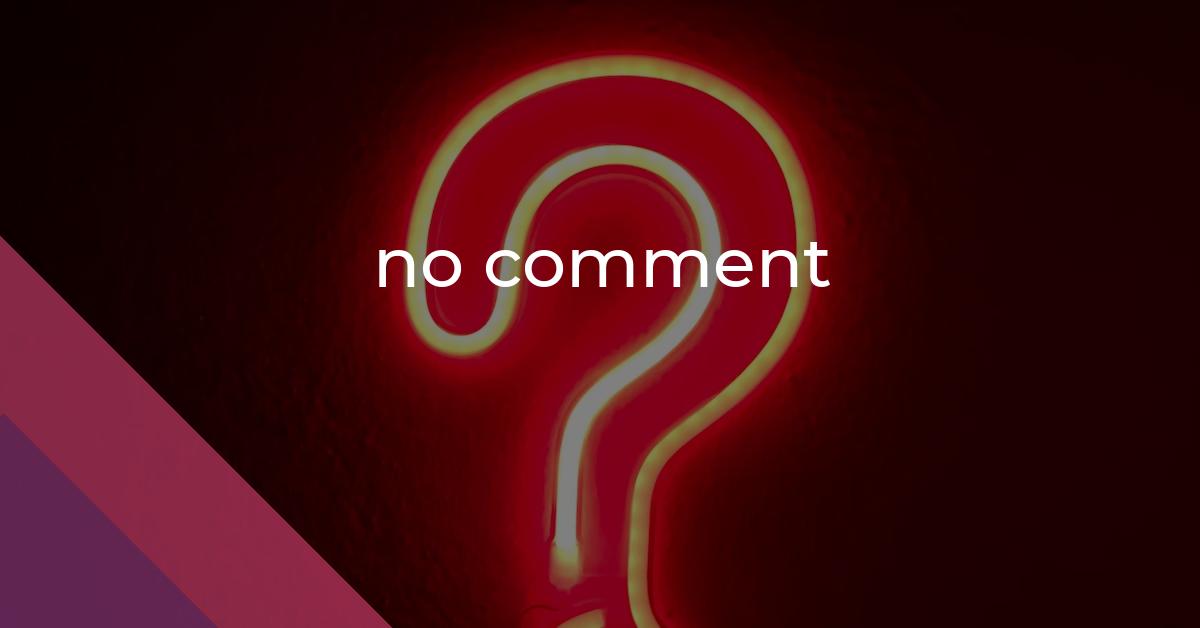no comment: Idiom Meaning and Origin
What does ‘no comment’ mean?
No comment: A phrase used to decline making a statement or providing information, particularly in situations where it may be diplomatically or legally advantageous to avoid giving a direct response.

Idiom Explorer
A "wall of silence" is an expression used to describe a situation where people refuse to speak or give information about something, usually to protect someone or hide a wrongdoing.
The idiom "say no more" is used to convey that there is no need to provide further explanation or information, as the listener already understands the intended meaning.
"Or words to that effect" is an idiomatic phrase used to suggest that the exact words or details are uncertain or approximate, but convey a similar meaning or idea.
The idiom "or something" is used to suggest an uncertainty or vagueness. It implies that there may be additional information or options available, but the speaker is unsure or does not want to specify them.
An idiom meaning to present an alternative viewpoint or contrasting information.
When someone does something "on the hush," they are doing it secretly or without others knowing. It refers to keeping something quiet or confidential, often to avoid getting in trouble or causing a disturbance.
The idiom "on the down-low" means to keep something secretive or hidden, usually referring to activities, information, or relationships that people want to keep confidential or not openly disclose. It suggests a sense of secrecy or discretion.
The idiom "one's lips are sealed" means to keep one's mouth shut and not reveal a secret or confidential information.
An idiom, "one moment," is often used to ask for a brief pause or to indicate a short delay in a conversation or an action.
The idiom "no ways" is used to express strong disbelief or refusal towards something. It indicates a firm stance or disagreement and is often used as a response to a suggestion or proposal.
Exploring Unspoken Sentiments
No comment is an idiom that means refusing to provide any information or opinion on a specific matter. It is often used by individuals, especially public figures, when they do not want to give a statement or answer a question. The phrase "no comment" emerged in journalism as a way to indicate that a person or organization being questioned has chosen not to provide an official statement or insights on a particular issue or topic. This response is commonly used to avoid making controversial or damaging statements. Legal professionals also advise their clients to respond with "no comment" during legal proceedings, especially when confronted with sensitive questions. By refraining from commenting, individuals can protect themselves from incriminating or disclosing information that may harm their interests in a legal case.
In everyday conversations, "no comment" has become a phrase used when individuals wish to refrain from discussing a particular topic or do not want to share their opinions or personal information. It allows them to maintain their privacy, avoid confrontation, or disengage from a conversation. The usage of "no comment" has permeated various aspects of modern culture, including literature, films, and television shows. It often symbolizes secrecy, evasiveness, or a deliberate refusal to engage with a specific subject. The phrase has even become a meme, representing the withholding of information or a lack of willingness to provide a clear response.
However, despite its widespread recognition, "no comment" can sometimes raise suspicion or curiosity. When someone responds with this phrase, it may lead others to believe that there is something to hide or that the matter at hand is more significant than initially thought. The absence of a comment can be as telling as a direct response, leaving room for speculation and interpretation.
In addition to its literal meaning, "no comment" is related to two idioms: "not at all" and "say no more."
The idiom "not at all" is used to express a complete denial or negation. When someone asks a question or makes a statement to which you want to respond negatively, you can use the phrase "not at all" to indicate that the situation or statement is entirely false or incorrect. This response is often used in casual conversations to dismiss a misunderstanding or clarify a misconception. While "not at all" is not directly connected to "no comment," both idioms convey a negation or denial, although in different contexts.
The phrase "say no more" is used to convey an understanding or agreement without further explanation. When someone makes a suggestion or hints at something that you fully grasp or support, you can respond with "say no more" to indicate that there is no need for elaboration or additional words. It implies that you are on the same wavelength and do not require further persuasion or clarification. While "say no more" may not seem directly related to "no comment," both idioms share the idea of avoiding further discussion or explanation. In the case of "no comment," it is a refusal to engage, while "say no more" acknowledges a mutual understanding without the need for additional communication.
"no comment" is a widely recognized idiom used to refuse to provide a statement or offer insight on a particular matter. It originated in journalism and law but has since become prevalent in everyday conversations and cultural references. While it can indicate a desire for privacy or the avoidance of controversy, the absence of a comment can also generate suspicion and curiosity. The related idioms "not at all" and "say no more" convey negation and a mutual understanding, respectively. "No comment" stands as a reminder of the complexities of communication and the ongoing quest for transparent dialogue.
Example usage
Examples of how the idiom no comment can be used in a sentence:
- "When asked about the ongoing investigation, the lawyer simply replied, 'No comment.'"
- "During the press conference, the politician avoided answering any controversial questions by repeatedly saying, 'No comment'."
- "The celebrity was hounded by reporters seeking details about their personal life, but they maintained their privacy by consistently responding with 'No comment'."
More "Expression" idioms



